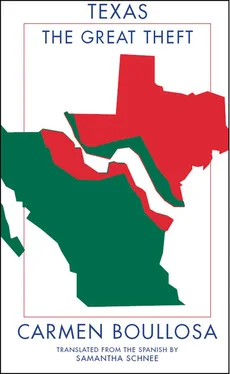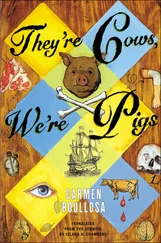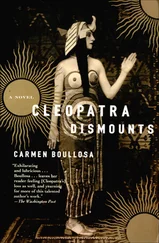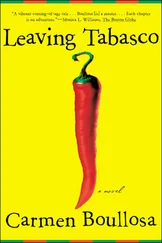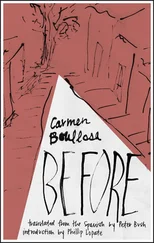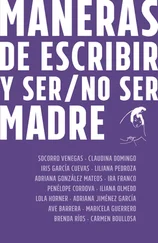Don Jacinto, the saddler, crosses the square toward Café Ronsard carrying his new creation, “a really fancy one.” (He’s from Zacatecas, and he’s been married three times. Two days a week he works in Bruneville, the rest of the time he’s across the river in Matasánchez. Business is good.) He announces to one and all, “I want to show this one to Don Nepomuceno. No one else will appreciate its fine workmanship like him.” Everyone knows that if Nepomuceno expresses his admiration it will fetch a better price. No one knows more about saddles and reins, no one handles a lasso or rides as well. It’s not so much that horses obey him as they have a mutual understanding.
Don Jacinto is near-sighted and can’t see more than two yards in front of him or he would have witnessed the scene as well. But he’s not deaf; he hears the blows clearly, and Nepomuceno’s words, and Shears’ response, which stops him in his tracks. He can’t believe the carpenter would speak to Don Nepomuceno that way.
Peter, whom the Mexicans call “El Sombrerito,” owns the hat shop. His original surname being unpronounceable, he changed it to “Hat” for the gringos: “Peter Hat, hats of felt, and also of palm, for the heat.” He is hanging a new mirror on the column in the middle of his store when, in the mirror’s reflection, he sees Shears pistol-whipping Lázaro Rueda, “the violinist vaquero ” (a vaquero being a Mexican cowboy). He also sees Nepomuceno approach, and the kid who goes around with La Plange, the one they call “Snotty,” running toward them. His instincts tell him something bad’s about to go down. He takes down the mirror (“Why, Mr. Hat?” asks Bill, his assistant, “It was almost straight.”), stowing it safely behind the counter, and sends Bill home with a few coins. (“Help me close up shop and skedaddle! And don’t come back to work till I send for you!”). He lowers the blinds and locks the front doors of his establishment, crosses the threshold that separates the store from his home, double bolts the door from inside and shouts to his wife, “Michaela! Tell the kids not to go outside, not even on the patio, and lock all the windows and doors; no one sets foot outdoors until this storm blows over.”
Peter Hat goes to the patio and cuts two white roses with his pocketknife and takes them to his altar to the Virgin, next to the front door. He kneels on the prayer stool and begins to pray out loud. Michaela and the children join him; she takes the roses from his hand and puts one in a delicate blue vase, the same color as the Virgin’s robes, and the other in her husband’s buttonhole.
Mother and children begin drowning their worries in hurried Hail Marys.
But Peter, the more he prays the more worried he gets. His soul is like a poorly woven hat, full of imperfections.
Before leaving, tow-headed Bill had just stared at Peter, unable to understand what had upset him, unable to help.
Out in the street he adjusts his suspenders. He’s spent every penny he’s ever earned working for Peter on these expensive, trendy suspenders.
He soon catches on to what’s happening down in the market, and, instead of heading home, he runs across the square to the jailhouse.
His uncle, Ranger Neals (who oversees the prison and is highly regarded), listens closely to Bill’s report.
“That idiot Shears … insulting Nepomuceno is gonna land us all in a heap of shit.”
Others arrive at the jailhouse door, fast on Bill’s heels: Ranger Phil, Ranger Ralph, Ranger Bob. They’re bearing the same news, and they arrive just in time to hear him say to his nephew:
“Let’s sit tight, no one makes a move, got it?”
They don’t stick around to hear the rest. They run to relay orders to the other Rangers.
“We don’t want to start a wildfire. This is a bad business.”
Urrutia is the prize prisoner in Bruneville’s jail. He’s one of a gang of bandits who help fugitive slaves cross the Rio Grande. The minute they set foot on Mexican soil they become free men by law. Urrutia lures them with the promise of land in Tabasco. He shows them contracts that are more fairy-tale than anything else. He describes fertile land, wide canals, cocoa plants growing beneath shady mango trees, sugar cane. He’s vague about the exact size and location, but that doesn’t matter, given such promising prospects.
Urrutia does take them to Tabasco. The landscape is exactly as he described. But the reality is different. Urrutia has valid contracts that commit them to indentured servitude and maltreatment — it might as well be imprisonment. The lucky ones die from fever or starvation before the first whipping.
Urrutia’s men have made a fortune doing this. Sometimes, when a slave has unusual value, they return him to his original owner for a ransom. They even brag about the free Negros they catch in their net, selling them at a premium because, being strong and healthy, “they make good foremen.”
Urrutia is guarded by three gringos who get paid extra wages because the mayor suspects Urrutia’s accomplices — numerous and well-armed — will try to rescue him (we’ll get to the mayor’s story later; suffice it to say that the notion he’s been elected by popular vote is preposterous). The three guards, whose names can’t be divulged, overhear the story of the insult without paying it much attention. They’re only here for the money (which isn’t always paid on time, to the chagrin of their families); if Nepomuceno offered them more money they’d work for him, despite the fact that they’re gringos.
When Urrutia hears about Shears and Nepomuceno, a sudden change comes over him; he’s like an autumn leaf about to fall from the tree. And for good reason.
Werbenski’s pawn shop sits between the jailhouse and the hat shop. It’s not a bad business, but the really profitable part takes place at the back of the store: the sale of ammunition and firearms. Werbenski doesn’t go by his real name to hide the fact that he’s Jewish — no one knows where he came from. Peter Hat can’t stand him, Stealman takes no notice of him (but Stealman’s men do business with him, same as Judge Gold and Mr. King). He’s married to Lupis Martínez, a Mexican, of course—“What can I do for you, sir?”—the sweetest wife in all of Bruneville, a real gem, and a smart one, too.
Like Peter Hat, Werbenski senses there will be repercussions from the Shears-Nepomuceno affair, but he doesn’t shut up shop. He tells Lupis to get to the market quickly, before things get really bad.
“But sweetie pie, we went early this morning.”
“Stock up. Buy all the dry goods you can. Get bones for the soup.”
“We’ve got rice, beans, onions, potatoes, and we’ve got tomatoes and peppers for salsa growing in the back. There’s water in the well …”
“Get some bones, for the boy.”
“Don’t worry, sugar plum, the chicks are growing up, the hen is laying eggs, we’ve got the two roosters, though one is old; there’s the boy’s rabbit, and the duck that mother gave me. The turtle is hiding somewhere, but if we get hungry I’ll root it out, and if I can’t find it I’ll stew up the iguanas and lizards like my aunts do.”
The last bit was intended to make her husband smile, but he wasn’t even listening; neither of them could stand Aunt Lina’s iguana stew, not because of the way it tasted but on account of skinning the animals alive. Werbenski’s head is reeling, but he takes comfort in the fact that they baptized his boy. They may do what they want with a Jew, but my wife and my son must be saved . Lupis reads his mind.
“Don’t worry sweetie pie.”
Lupis adores him. She’s naturally sweet-natured, but she knows she’s got the best husband in all Bruneville — the most respectful, most generous, most sensible. A Jewish husband is worth his weight in gold.
Читать дальше
